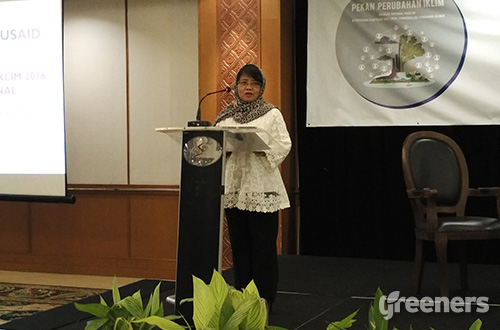Jakarta (Greeners) – Post Morocco Climate Change Conference, Indonesia should have put adaptation and mitigation efforts more seriously, said a senior official, in Jakarta, on Thursday (24/11).
Director General of Climate Change Control, Ministry of Environment and Forestry, Nur Masripatin, said that regional administrations need to integrate mitigation and adaptation into their development planning considering that adaptation also inseparable part from disaster risk reduction management.
“Regional [goverments] needs to start to be serious in this adaptation program. If not, we would not be able to achieve emission reduction targets. In addition, climate change adaptation and disaster risk reduction management can no longer be seen as two different things,” said Masripatin.
READ ALSO: Kupang City Set Example as Coastal Area Prone to Climate Change
To integrate the two, she added, is becoming crucial and common target to develop resilient, protect the environment, and preserve social economy quality and capacity.
Bigger attention for adaptation and mitigation programs, funding support, technology transfer, and capacity building must spread equally as common treatment is suggested in the Nationally Determined Contributions (NDC) implementation.
“Discussions and international agreement will be meaningless without real actions in the field to increase resilient against the unavoidable climate change,” she said. “That is why regional as a stakeholder who will feel these impacts need to understand the importance of adaptation and mitigation.”
READ ALSO: Paris Agreement Ratification Needs To Be In Line With Emission Commitments
Director of Disaster Risk Reduction, National Agency for Disaster Management (BNPB), Lilik Kurniawan, said that high disaster numbers were caused by changes in climate pattern worsen by man activities, ecosystem damages and carbon production leading to decreasing environment quality.
In 2016, said Kurniawan, more than 80 percent of these disasters was hydro-meteorology or disasters linked with climate.
“Disasters as impacts of climate change have become unavoidable so we need to adapt immediately,” he said.
Budi Sulistyono, Ngawi head of district, and representative of Indonesia’s Regional Administration, said that with current condition, all district heads should have been panicked to start to prepare disaster anticipation program, especially to include adaptation programs into the 2017 regional budget.
Furthermore, he said that not all regional leaders have incorporated climate change mitigation and adaptation into disaster management.
“So, there are rivalries between regional leaders to attract investors which the trade offs, more than often, were decreasing green open space. Meanwhile, they need to be consequent in their spatial planning. But, now, what investors want, investor get,” he said.
Report by Danny Kosasih



















































